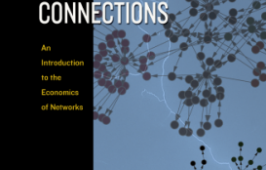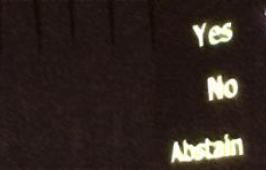Social Choice
Social Choice theory is the study of collective decision processes, their procedures and their consequences on welfare. It studies questions such as how to aggregate individual preferences into social preferences; what the properties of different voting systems are; what the resource allocation mechanisms are that take into account the incentives of the participants. The aims of Social Choice are twofold: first, to study particular models that are important for its application to real life (such as the study of the outcomes obtained by run-off voting systems); and second, to take a normative point of view in designing ideal systems (such as the design of decentralized allocation mechanism for the allocation of public goods or institutional design). The tools used range from axioms to game theory.
Related posts
|
Article We characterize the set of all obviously strategy-proof and onto social choice | READ MORE ... |
Article We study the school choice problem in which a school district assigns school | READ MORE ... |
Working paper Pierre Daunou, a contemporary of Borda and Condorcet during the era of the | READ MORE ... |
|
Working paper For the division problem with single-peaked preferences (Sprumont, 1991) we | READ MORE ... |
Working paper One of the most famous ranking methods for digraphs is the ranking by Copeland | READ MORE ... |
Article We propose an analytical approach to the problem of influence maximization in a | READ MORE ... |
|
Article We study stochastic voting models where the candidates are allowed to have any | READ MORE ... |
Article Climate change is a global externality that has proven difficult to address | READ MORE ... |
Article This paper studies adaptive learning in the class of weighted network games. | READ MORE ... |
|
We recommend this new book which contains articles by several contributors from | READ MORE ... |
Article We study the problem of designing a voting rule which makes voting by cut-off | READ MORE ... |
Working paper We stress the importance that Arrow attached to studying the role of domain | READ MORE ... |
|
Working paper We provide a first study of the threshold model, where both conformist and anti | READ MORE ... |
From theory to application The advances in FinTech are concomitant with the development of digital | READ MORE ... |
Working paper In an interconnected world, economic and political interests inevitably reach | READ MORE ... |
|
Working paper In an interconnected world, economic and political interests inevitably reach | READ MORE ... |
Working paper This paper reports on laboratory experiments on the formation of partnerships | READ MORE ... |
Article In this paper we examine the effects of valence in a continuous spatial voting | READ MORE ... |
|
Article In this paper we provide sufficient conditions for a social choice rule to be | READ MORE ... |
Book Problems of fair division, equitable cost-sharing, division of a joint benefit | READ MORE ... |
Book Networks pervade social and economic life, and they play a prominent role in | READ MORE ... |
|
Article We compare the Egalitarian rule (aka Egalitarian Equivalent) and the | READ MORE ... |
Working paper A partially-honest individual is a person who follows the maxim, "Do not | READ MORE ... |
Article This paper aims to address two issues related to simultaneous aggregation of | READ MORE ... |
|
Working paper We study global games of regime change within networks of truthful | READ MORE ... |
Article We study a model that integrates productive and socializing efforts with | READ MORE ... |
Other The paper provides consistent mathematical framework for seminal Tiebout free- | READ MORE ... |
|
From theory to application Gender inequality in the workplace has attracted considerable attention in | READ MORE ... |
Working paper A social choice correspondence is self-implementable in strong equilibrium if | READ MORE ... |
Working paper Finitely many agents have single-peaked preferences on a finite set of | READ MORE ... |
|
Working paper Approval voting allows voters to list any number of candidates. Their scores | READ MORE ... |
Article Rules of k names are methods that allow two potentially conflicting parties to | READ MORE ... |
Article Individuals form preferences through search, interviews, discussion, and | READ MORE ... |
|
Article This article incorporates self-fulfilling mistakes into an otherwise classical | READ MORE ... |
Article Aziz and Stursberg propose an “Egalitarian Simultaneous Reservation” rule (ESR | READ MORE ... |
Working paper The outbreak of epidemics, the rise of religious radicalization, or the | READ MORE ... |
|
Working paper The rise and success of digital platforms (such as Airbnb, Amazon, Booking, | READ MORE ... |
Working paper The possibility of designing efficient, ex-post incentive compatible, single | READ MORE ... |
Working paper Inequalities in democracies are multi-faceted. They not only incorporate | READ MORE ... |
|
Article A mixed manna contains goods (that everyone likes) and bads (that everyone | READ MORE ... |
Article In this paper, we investigate gender differences in workers' career | READ MORE ... |
Article We consider the class of voting by committees to be used by a society to | READ MORE ... |
|
Article We consider a society whose members have to choose not only an outcome from a | READ MORE ... |
From theory to application People often behave more socially oriented when their actions are observable by | READ MORE ... |
Article Share equilibrium was introduced in van den Nouweland and Wooders (2011) as an | READ MORE ... |
|
From theory to application . |
Article We study a notion of non-manipulability by groups, based on the idea that only | READ MORE ... |
Article Aziz and Stursberg propose an “Egalitarian Simultaneous Reservation” rule (ESR | READ MORE ... |
|
Article We consider a society whose members have to choose not only an outcome from a | READ MORE ... |
Working paper We propose a framework for the analysis of choice behavior when the later | READ MORE ... |
Working paper Connections appear to be helpful in many contexts such as obtaining a job, a | READ MORE ... |
|
Working paper We study collective decision-making procedures involving the formation of an | READ MORE ... |
Working paper This paper analyzes farsighted stable sets when agents have heterogeneous | READ MORE ... |
Working paper Tragedy of the Commons and Evolutionary Games in Social Networks: The Economics of Social Punishment
This study revisits the problem of the tragedy of the commons. Extracting | READ MORE ... |
|
Working paper We study mechanisms for environments in which only some of the agents are | READ MORE ... |
From theory to application The recent vote on the Brexit, and the withdrawal of the US from the Paris | READ MORE ... |
Article Users share the cost of unreliable non-rival projects (items). For instance, | READ MORE ... |
|
Article We model inter-individual differences in preferences for redistribution as a | READ MORE ... |
Working paper We provide an analytical approach to the problem of influence maximization in a | READ MORE ... |
Article This paper advances the hypothesis that in societies that suffer from | READ MORE ... |
|
Working paper An information aggregation problem of the Condorcet Jury Theorem is considered | READ MORE ... |
Article We propose and study a new axiom, restricted endowment additivity, for the | READ MORE ... |
Article Many studies have used self-reported dyadic data without exploiting the pattern | READ MORE ... |
|
Working paper A revolt or protest succeeds only if sufficient people participate. We study | READ MORE ... |
Working paper We study the extent to which the widely used Boston Mecha- nism (BM) fosters | READ MORE ... |
Article Feasible elimination procedures (Peleg, 1978) play a central role in | READ MORE ... |
|
Constanze Binder, Burak Can and Ulle Endriss are the organisers of the Dutch | READ MORE ... |
Working paper We study private communication in social networks prior to a majority vote on | READ MORE ... |
Working paper We consider the problem of assigning agents to slots on a line, where only one | READ MORE ... |
|
Article We study solutions that choose lotteries for profiles of preferences defined | READ MORE ... |
Article Type structures are a simple device to describe higher-order beliefs. However, | READ MORE ... |
Article We show that a policy of disclosing the ticket sales during a fundraising | READ MORE ... |
|
Article We consider a cheap-talk setting that mimics the situation where an incumbent | READ MORE ... |
Article Consider a society with a finite number of sectors (social issues or | READ MORE ... |
Article There are a number of single-profile impossibility theorems in social choice | READ MORE ... |
|
Article This paper incorporates self-fulfilling mistakes into an otherwise classical | READ MORE ... |
Article We introduce within-group external effects in the two-sided singlehoming model | READ MORE ... |
Article This paper examines Nash jurisdictional stability in a model with a continuum | READ MORE ... |
|
From theory to application . |
Working paper Feasible elimination procedures Peleg, 1978 play a central role in constructing | READ MORE ... |
Article Uncertain outcomes are an inevitable feature of policy choices and their public | READ MORE ... |
|
Article Duverger’s Law states that plurality rule tends to favor a two-party system. We | READ MORE ... |
Working paper We introduce a new notion of non-manipulability by groups, based on the idea | READ MORE ... |
Working paper We consider collective decision problems where some agents have private | READ MORE ... |
|
Working paper In this paper I investigate mutual insurance arrangements restricted on a | READ MORE ... |
Working paper We propose the average approach,where the worth of a coalition is a weighted | READ MORE ... |
Article We investigate the role of manipulation in boundedly rational opinion dynamics | READ MORE ... |
|
As part of 50 Days @ CORE, the Center of Operations Research and Econometrics ( | READ MORE ... |
Working paper We study a linear location model (Hotelling, 1929) in which n (with n ≥ 2) | READ MORE ... |
Working paper We consider a model of opinion formation based on aggregation functions. Each | READ MORE ... |
|
Working paper In a finite-horizon intertemporal setting, in which society needs to decide and | READ MORE ... |
Working paper Consider a society with a finite number of sectors (social issues or | READ MORE ... |
Working paper Online social networks, such as Facebook, disclose an unprecedented volume of | READ MORE ... |
|
Article Many instances of social interaction display either or both of the following | READ MORE ... |
Article In this paper, we describe a process of validation for an already published | READ MORE ... |
Article Many salient rules to allocate private goods are not only strategy-proof, but | READ MORE ... |
|
Article We provide a characterization of a class of rank-mobility measures. These | READ MORE ... |
Working paper In a polarized committee, majority voting disenfranchises the minority. By | READ MORE ... |
Working paper We show that every strategy-proof and unanimous probabilistic rule on a binary | READ MORE ... |
|
Article An assignment of students to schools displays zero-segregation if all schools | READ MORE ... |







